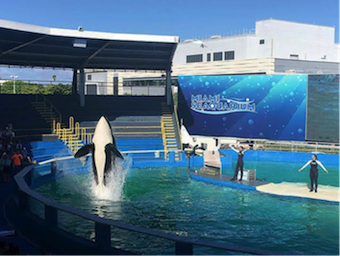For half a century, the Miami Seaquarium has been a prison cell for Tokitae, an orca captured from the Salish Sea in 1970. Given the stage name Lolita by her captors, she was put on display and forced to perform for her living. She has remained there to this day. Now completely alone, she does two shows a day, and never experiences contact with others of her kind. The tank in which she is confined is 80 ft. (about 25 meters) long, less than half as wide, and only 20 ft. (6 meters) deep. Tokitae herself is 22 ft. long, so not only can she swim fewer than four body lengths before having to turn around, the depth of the tank affords her little protection from the hot Florida sun.
This is too small to comply with the state’s own laws, but no one in authority has yet felt a need to do anything about it. This is despite numerous public campaigns on Tokitae’s behalf. Lawsuits over her welfare can be expected to continue. Hopefully one day leading to a better result.
Tokitae is the last remaining survivor of 45 orcas that were taken alive during the years of large-scale captures from the Salish Sea. Those waters are home to The Lummi Nation, a Native American tribe in northern Washington and southern British Columbia. Also known by the traditional name Lhaq’temish, they’ve historically been strong advocates for environmental justice. Today, the Lummi have become the ultimate champions of the fight to redress the horrible wrongs done to Tokitae for so many years.
One of their most significant accomplishments was the 2016 cancellation of the Gateway Pacific Terminal project. This would have increased rail traffic across the state and along the Salish shoreline to what would have been one of the largest coal export ports on the continent. The Lummi argued that traffic through their sacred village site of Cherry Point was a breach of their rights under the Treaty of Point Elliot, and that an increase in shipping traffic would dramatically increase the chance of a major oil spill in the Salish Sea. After a long fight, the US Army Corps of Engineers agreed that the risk of irrevocable environmental damage was too great, and they denied the construction permit on behalf of the Lummi.
The Lummi have a strong connection with the Salish Sea, having depended on it for thousands of years. Today’s campaigns seek to address the many new factors that stress the ecology of the region. These include plans to redirect marine vessels, to seek sustainable development options, and to restore healthy salmon populations. All of these offer enormous potential benefit to the Southern Resident Orcas, but the Lummi’s dedication to the whales goes well beyond that.
The word “qw’e lh’ol me chen” means “our relations who live under the sea”. The Lummi have dedicated this word to the orcas, whom they consider family. To the Lhaq’temish orcas are people. They correctly surmised long ago that the whales have languages and cultures of their own. As such, they see very clearly the injustice done to Tokitae, who continues to languish in her tiny concrete tank a continent away.
To the Lhaq’temish peoples, Tokitae is one of their own, and they would like to bring her home.
The tribe has vowed to continue the fight until Tokitae can return to her “native habitat and ancestral waters”. This goal is very ambitious for an individual who’s spent 50 years in captivity. Relocation from the Seaquarium back to the wild would require intensive rehabilitation efforts and medical care from skilled people, as well as time and money. The hope is that this could take place inside a seapen in a protected area, where her family can come visit. Gradually, she could be re-trained for her release into the wild.
The Lummi believe that systemic change is needed in order to save the Southern Resident Orca population from extinction. They and other groups (such as the coalition of the Earth Law Center and the community group Legal Rights for the Salish Sea) are working towards recognizing the rights of the orcas. Doing so would give them a higher form of legal protection, and would include (among other things) rights to: “life, autonomy, culture, adequate food supply and free and safe passage.” The coalition believes that codification of these rights – especially to free and safe passage – would imply “a legal framework in support of the Lummi Nation’s fight to free Tokitae back to the Salish Sea”.
Howard Garrett, Director of the group Orca Network, said of Tokitae, “We would like to see her enjoy her life. We would like to see her be able to swim free in the waters where she grew up.” To the Lhaq’temish, seeing Tokitae swim free will also serve a larger goal – it will bring back peace to the Salish Sea.
For The Orca’s Voice,
Chris, Canadian Cetacean Alliance



Leave a Reply